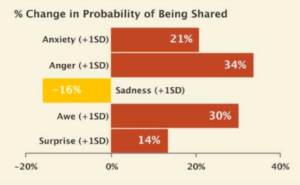
Add Abracadabra to Your Message with Magic Words
Book review: Jonah Berger’s “Magic Words”
If you read only one book about persuasion this year, make it Magic Words: What to Say to Get Your Way.

The author, Jonah Berger, is a marketing professor at the Wharton School at the University of Pennsylvania and has written several books, including Contagious.
I love Magic Words because it’s chock full of usable ideas for leaders, marketers, and communicators. We apply these lessons to our clients’ Message Maps.
Berger’s premise is this: among the 16,000 words a person uses each day, certain words have more impact than others.
For example, these words lend you power:
- Because: When you say “because” and follow it with any reason, good or bad, more people comply with your request, as Dr. Ellen Langer’s experiment proved.
- Recommend (instead of like) makes people 32% more likely to take your suggestion.
- Is not (instead of isn’t) in a product description makes people willing to pay $3 more for the product.
“It’s hard to get people to listen, to pay attention, to persuade them to do what we want … but the right words can help,” Berger writes. “The right words, used at the right time, can change minds, engage audiences, and drive action.”
Certain words activate people’s identity and agency
For example, when it’s time to pick up the toys, ask kids to be a “helper” instead of asking them “to help.” This small change increased kids’ helping by one-third.
Why does this work? Because reframing turns the action (to help) into an identity (to be a helper). Category labels like “helper” imply permanence and hint at the essence of who someone is.
Here are more examples of framing actions to help people claim desired identities:
- Call people “voters” instead of encouraging them to “vote,” and turnout rises by 15%.
- Name someone a “runner” instead of saying she “runs.”
- Call someone a “leader” instead of telling them to “lead.”
- When you want to be mean, call someone a “loser” instead of saying he “loses.”
The right words matter when you talk to yourself
The right kind of self-talk can help you become even more successful.

For example:
· To resist temptation, say “I don’t” instead of “I can’t.” By doing so, you keep your focus of control internal.
· To turn down unwanted requests, say “I can’t.”
· To come up with more creative solutions, say “I could …” instead of “I should …”
· Ask others for advice about what you “could” do rather than what you “should” do. You gain side benefits: asking for advice makes you seem smarter to those you ask, and it makes them feel smarter too.
Reduce performance anxiety before a speech
To reduce your performance anxiety before a speech, talk to yourself as someone else would talk to you.
Use your own name or “you” in self-talk, instead of saying “I” or “me.”
Why? Because when you talk to yourself as another person would, you can see yourself more objectively. Positive self-talk helps you perform better, either as a speaker or as an athlete.
“You” increases social media engagement, but it hurts customer service
The word “you” increases reader engagement in social media. That’s why we continue to encourage our clients to use the word you in social media and on websites.
Using the word “you” helps a B2B website stand out because nine out of 10 marketers’ websites talk primarily about themselves with “we, ours, and us.”

Only about one out of eight B2B websites puts customers first with words such as “you, your, and yours,” a Forrester study found.
However, in customer service calls, the more customers hear the word “you,” the more they perceive they will have to do more work!
That’s why, in a customer service context, the word “you” can backfire.
Customers can hear the word “you” in an accusatory way, placing unintended blame or burdens on them.
Audiences respond to presenters’ confidence
In court, judges, lawyers, and experts speak with authority. Speaking like professionals makes them seem more credible, trustworthy, competent, and convincing.
Confident speakers sound different from everyday speakers because they:
- Use fewer formal words such as “please” and “yes, sir.”
- Avoid filler words like “umm,” “uh,” and “er.”
- Are less likely to use hedging words such as “in my opinion,” “maybe” or “sort of.”
- Are less likely to turn statements into questions, such as “You were there that night … weren’t you?”
- Are more likely to use definitive words like “definitely,” “everyone,” “guaranteed” or “clearly”.
- Turn past tense verbs into the present tense, saying “is” instead of “was,” or “find” instead of “found.” The present tense implies that an action will continue into the future.
Here’s one more characteristic of confident speakers – they know when to express doubt about a contentious issue. When trying to win over the other side, they don’t lead with information.
Instead, they start by acknowledging that conflicting beliefs are valid and by encouraging people to be more open-minded and receptive. That approach helps the other side feel validated, which makes them more willing to listen.
Audiences see journalists and scientists who acknowledge the limitations of their sources or studies as more trustworthy. When these experts turn statements into questions, they invite more open feedback from the audience.
4 ways to ask better questions

1. Ask follow-up questions to make a better first impression and encourage your conversation partners to elaborate. You’ll be perceived more positively (and if you’re on a first date, you’re likelier to be asked out on a second date).
2. Deflect difficult questions by asking a related question of your own. You’ll seem more interested and engaged. (Note: the exception is a persistent reporter, who will repeat the same question over and over until it’s answered.)
3. Don’t make assumptions in a negotiation. Avoid presuming the absence of negative issues when you’re buying an item. Don’t ask open-ended questions like, “What can you tell me?” Instead ask, “What problems does it have?” Or ask, “It doesn’t have any problems, does it?”
4. Start with safe-to-answer questions, then build up gradually to more thorny questions.
Choose concrete or abstract words to fit the occasion

Choose concrete words for most occasions. Concrete words help people answer the question “how?”, so they understand complex ideas, feel heard, and remember what was said better.
That said, abstract words work better than concrete words when you’re trying to:
- Help people see that an idea holds potential.
- Be seen as a forward-thinking visionary.
- Be seen as a more powerful leader or manager.
Why? Because abstract language suggests the bigger picture. That’s why Uber positioned itself to investors as a “transportation solution” rather than as a “ride.”
Employ emotion when it’s appropriate
People naturally want to focus attention on their successes. “Social media is a veritable greatest hits album,” Berger says.
But people make mistakes – and they’re judged differently for them, depending on whether they were seen as competent in the first place.
When an incompetent person makes a mistake, it reinforces negative impressions about them.
But when a competent person makes a mistake, it humanizes them, makes them feel more real, and increases their likeability.
Emotion works best in stories when it comes with intensity – when you build an emotional roller coaster, a story arc of ups and downs. Volatility adds drama to storytelling.
Keep the Tension Alive
Successful stories intersperse highly positive and negative moments to keep the tension alive. That’s how imperfections and failures can become assets in a story.
In reviews of experiences driven by pleasure (known as hedonic experiences), the more emotional the words in the review are, the more powerful they are to readers. For example, in restaurant or movie reviews, words like “loved” or “terrible” jump out.
But in utilitarian experiences driven by functional, practical considerations, emotionality tends to backfire. For example, since people buy razor blades or laundry detergent to get a job done, emotional words become irrelevant.

To keep audiences reading your content, emotional language increases engagement:
- People are 30% more likely to finish an article that made them feel anxious (compared with one that made them feel sad).
- Uncertain emotions such as surprise, hope, and anxiety encourage engagement. Here’s a study on how particular emotions drive sharing in social media.
- People stick around when they need to resolve what they didn’t know.
“Language is a fingerprint …”
“It leaves behind traces or signals of the person or people who created it,” Berger writes. For example, people who repay loans and people who default on loans speak differently:
- People who are likelier to repay loans talk mostly about themselves. Repayors talk about their financial situation and improvements in their financial ability – indicating their financial literacy.
- But people who are likelier to default on a loan talk mostly about others. Defaulters talk about their financial or general hardships, explain their situations or work states, and use the word “God” more often.
Financial institutions can analyze borrowers’ speech patterns to make better decisions about who gets a loan.
How to praise people more effectively
Here’s one last idea for you – what to say when it’s time to give praise.
Rather than praise a person, it’s better to praise their process or how hard they worked. Why?
Because praising a person’s process or hard work encourages them to keep going.
Praising a person is less effective at keeping them going.
Summaries at the end of each chapter make this book easier to consume. There’s also a well-researched set of references. Lots to learn from Magic Words.
Related Posts
How to move buyers from awareness to action
Awareness of the need for change is the first step in persuading people to act. In good news, awareness is the easiest step in...
How Message Maps Make Your Content Marketing Sing
Message maps make your content marketing sing. A strong message helps you break through our cluttered media landscape, win attention, be remembered, and inspire...
7 Lessons on Persuasion: Book Review
Marketers can learn 7 lessons about persuasion from a new book by Lee Hartley Carter, Persuasion: Convincing Others When Facts Don’t Seem to Matter. ...
Is your story ready to tell? 10-point message test
Is your customer, employee or investor message ready for launch? You’ve been slaving away for days, weeks or months to develop your company’s story....





